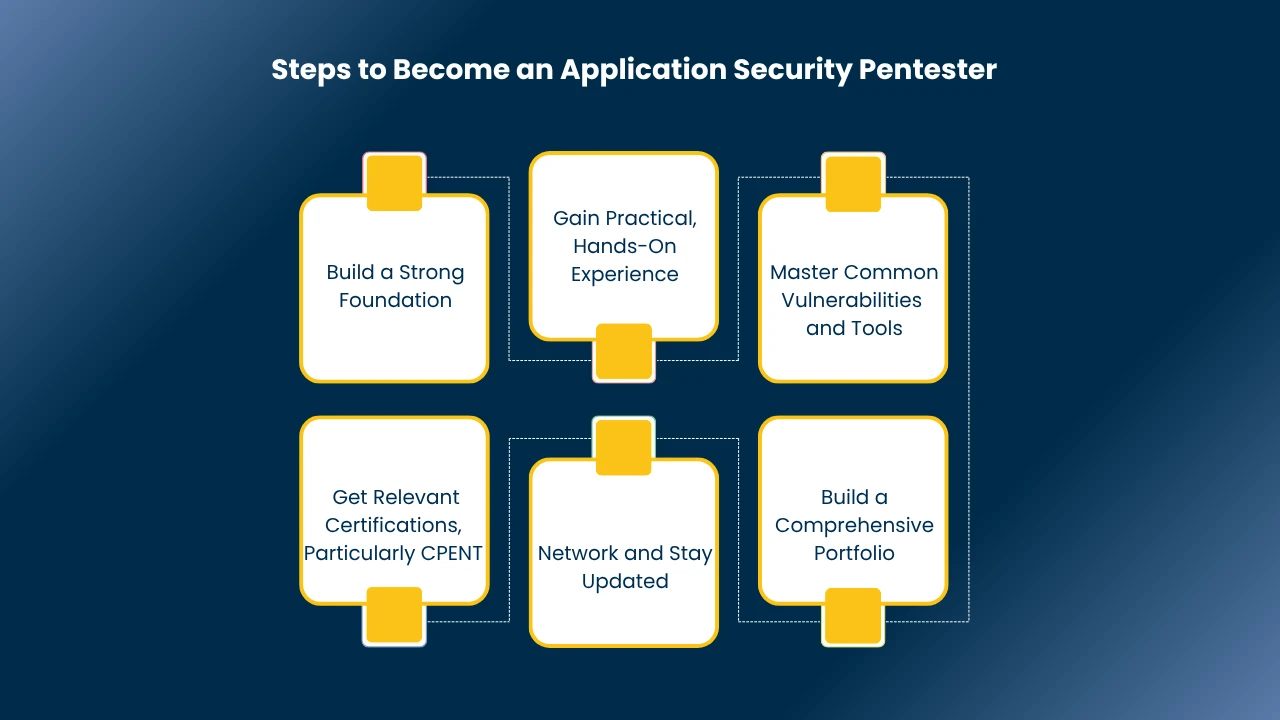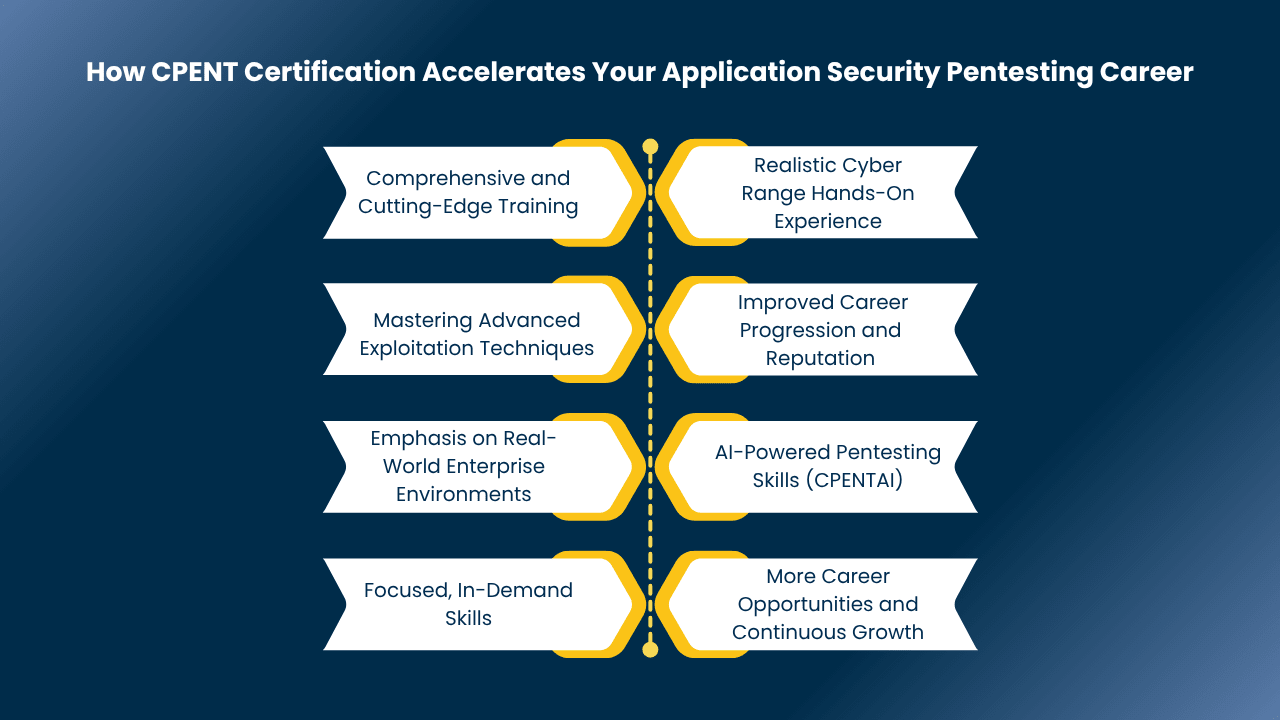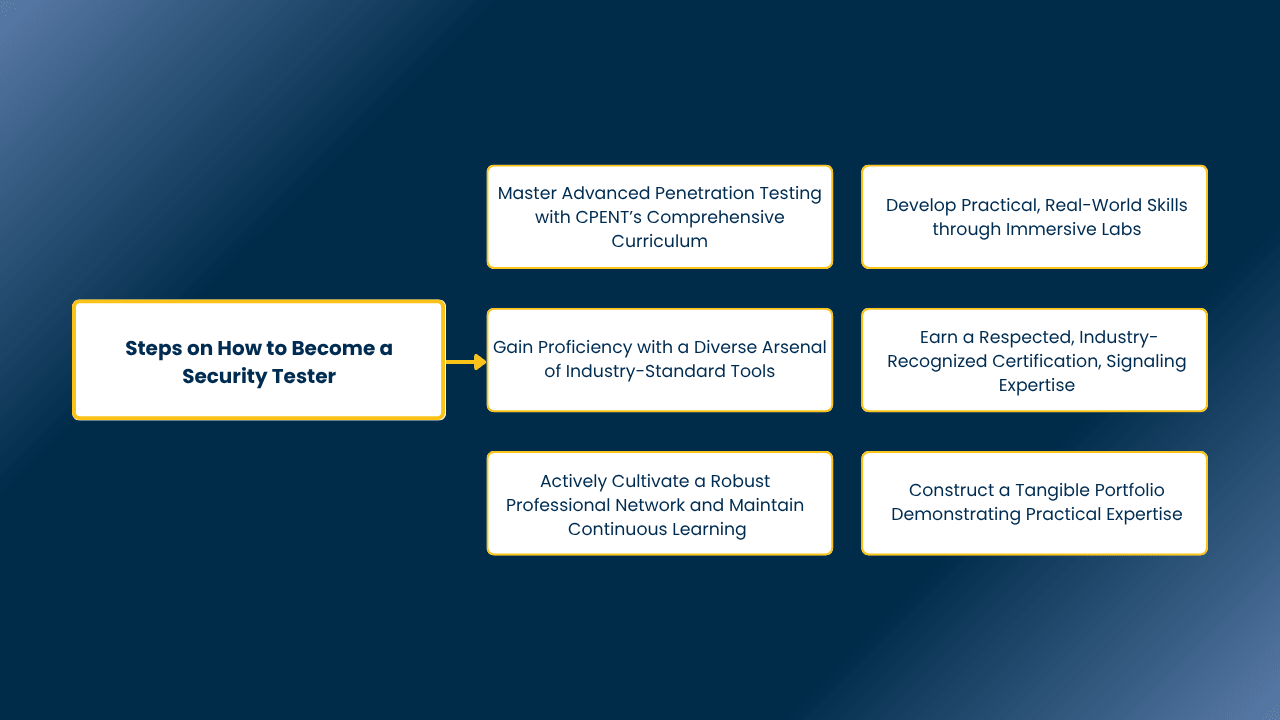Applications are the lifeblood of the companies in this digital age. These applications fuel everything from customer touchpoints to high-stakes operations. However, their dependence also carries with its new threat’s which is cyberattacks. That is why where application security pentesters comes in. These individuals hunt for vulnerabilities actively before hackers can exploit them. So, If you have passion for cybersecurity and want to counter threats. Becoming an application security pentester is your destiny. In this blog, we will learn the necessary steps, the essential key skills, and the career prospects in this industry.
Who is the Application Security Pentester?
An Application Security Pentester, also known as a web application pentester, is a security specialist. They operate like hackers but for the benefit of all. They mimic true attacks. They look for weak points in programs. Their quest? Identify weakness before the wrongdoers can. They shield sensitive information. They make certain applications are safe. They work as electronic protection guards. They stop intrusions. They play a crucial role in the contemporary online world. They safeguard programs.
Steps to Become an Application Security Pentester
Pursuing a career as an application security pentester involves a mix of technical proficiency and real-world skills. You’ll need to know how web applications work, be an expert in several security tools, and be current with the latest threats. Let’s dissect the important steps.
1. Build a Strong Foundation
Begin with the fundamentals. Learn about web applications, networking, operating systems, and databases. Online certifications and courses can help deliver the basics. This foundation is critical to understanding how applications work and where weaknesses may exist. A good foundation is the cornerstone of a successful pentesting career.
2. Gain Practical, Hands-On Experience
Don’t read about it, do it. Create a virtual lab and experiment with tools such as Burp Suite and OWASP ZAP. Orbus’s hands-on training is priceless here. Practical training enables you to put theoretical knowledge into practice in a secure environment. You’ll learn through experience, replicating actual attack scenarios.
3. Master Common Vulnerabilities and Tools
Study the OWASP Top 10 and learn about frequent attack points such as SQL injection and cross-site scripting. Learn how to use multiple pentesting tools. Being aware of these weaknesses and how to detect them through these tools is essential. This is the essence of application security pentesting.
4. Get Relevant Certifications, Particularly CPENT
Certifications prove your skills. Orbus’s CPENT certification is evidence of advanced pentesting skills and well known throughout the industry. Certifications are a concrete demonstration of your skills. They indicate that you have the right skills to employers.
5. Network and Stay Updated
Attend conferences, join online communities, and learn from experienced professionals. Cybersecurity is a field of continuous learning. Networking allows you to connect with peers and learn from their experiences. Staying updated ensures you remain relevant in the ever-changing cybersecurity landscape.
6. Build a Comprehensive Portfolio
Document your findings and create detailed reports. Showcase your practical skills to potential employers. Orbus’s CPENT training helps build this portfolio through practical labs and exercises. A strong portfolio demonstrates your ability to find and report vulnerabilities. It’s a powerful tool for showcasing your expertise to potential employers.
Skills Required for an Application Security Pentester
To really be an application security pentester, you’ll require a strong combination of technical skills and keen soft skills. It’s not merely about being familiar with code; it’s about being strategic and articulate. Let’s dissect the skills you’ll need:
Technical Skills: The Hacker’s Toolkit
- Programming and Scripting: Proficiency in Python, Bash, and familiarity with languages like Java, C++, PHP, and SQL is crucial for understanding application logic and automating attacks.
- Networking Mastery: A deep understanding of TCP/IP, UDP, DNS, and network security is vital for identifying and exploiting network-level vulnerabilities.
- Security Tools Expertise: Familiarity with tools such as Burp Suite, Wireshark, Nmap, and vulnerability scanners is necessary for performing effective penetration tests. Orbus’s CPENT program offers hands-on training with these tools.
- Vulnerability Exploitation: It’s a good thing that you have to understand how common vulnerabilities such as SQL injection, XSS, and CSRF work and how to exploit them.
- Operating System Proficiency: A strong understanding of Windows and Linux is needed in order to comprehend system behavior and identify possible weaknesses.
- Cryptography Knowledge: Familiarity with cryptographic principles and protocols is needed for the analysis of secure data transmission and storage.
- Web Application Architecture: Familiarity with web application construction and interaction with users and systems is important for detecting vulnerabilities.
- Secure Coding Practices: Familiarity with secure coding principles assists you in discovering and mitigating vulnerabilities in code.
- Cloud Security Awareness: Understanding cloud security principles becomes more vital with the cloud-fueled world today.
Soft Skills: The Pentester’s Edge
- Problem-Solving Prowess: Solving and analyzing tough security problems is vital.
- Communication Clarity: Clearly conveying technical conclusions to technical as well as non-technical peoples is important.
- Critical Thinking Acumen: Being able to think critically and analyze to find likely vulnerabilities is important.
- Adaptability Agility: The world of cybersecurity is always changing, so being adaptable is essential.
- Teamwork and Collaboration: Penetration testing is frequently a team effort, so good collaboration skills are essential.
- Research Rigor: Having the ability to research and remain current on the newest threats is essential.
- Report Writing Precision: Good report writing skills with clear and concise reporting are needed to document findings.
- Social Engineering Awareness: Familiarity with social engineering methods is necessary to identify potential weaknesses.
- Continuous Learning Drive: A commitment to continuous learning is essential in the ever-changing cybersecurity field. Orbus’s CPENT program encourages this mindset.
How CPENT Certification Accelerates Your Application Security Pentesting Career
Orbus’s CPENT certification isn’t just another piece of paper; it’s a powerful accelerator for your application security pentesting career. It provides expert-level training, practical experience, and advanced skills that are highly sought after in the industry.
1. Comprehensive and Cutting-Edge Training
The CPENT program offers a full-fledged curriculum that covers penetration testing of networks and web applications, wireless security, and IoT security. It extends beyond theory, with emphasis on practical applications.
2. Realistic Cyber Range Hands-On Experience
Orbus stresses realistic, hands-on experience using interactive cyber ranges and practical scenarios. This enables you to develop your skills in a controlled, simulated environment, allowing you to gain confidence for actual engagements.
3. Mastering Advanced Exploitation Techniques
CPENT prepares you with higher-level skills in topics such as advanced Windows attacks, exploit writing, single and double pivoting, and binary exploitation. These are the skills that distinguish good pentesters from the best.
4. Improved Career Progression and Reputation
Gaining the CPENT certification is a testament to high-level skills, making you more credible and a better job candidate. It indicates to employers that you’re prepared to handle sophisticated security issues.
5. Emphasis on Real-World Enterprise Environments
The course trains you for penetration testing in real-world enterprise networks, including IoT and OT systems. This emphasis on practical, enterprise-level skills is priceless.
6. AI-Powered Pentesting Skills (CPENTAI)
Orbus’s CPENTAI program combines AI-fueled pentesting competencies, applying to all steps of penetration testing. This positions you to deliver effective, enterprise-level penetration testing with state-of-the-art AI tools.
7. Focused, In-Demand Skills
CPENTAI instructs you to pentest IoT and OT environments, penetrate filtered networks, create custom exploits, execute complex Windows attacks and privilege escalation, and carry out binary exploitation and advanced pivoting.
8. More Career Opportunities and Continuous Growth
The need for CPENT-certified experts is high. With this certification, the doors are opened to multiple career opportunities, such as security tester, penetration tester, and security consultant. Orbus’s dedication to lifelong learning keeps you at the top of the continuously changing cybersecurity industry.
Salary and Career Opportunities
The pentesting of application security industry not only provides challenging and thrilling work, but also handsome monetary returns and varied career advancement. With more and more organizations focusing on strong cybersecurity, the demand for competent pentesters is on the rise. This gives rise to a competitive salary scenario and rich avenues for professional advancement. Let’s have a closer examination of the pay potential and career options in this fast-paced industry.
| Feature | Description |
|---|---|
| Entry level Salary | ₹6,00,000 per year |
| Mid-Level Salary | ₹12,00,000 per year |
| Senior-Level Salary | ₹18,00,000+ per year |
| Additional Pay | Bonuses, commissions, tips, profit sharing |
| Entry-Level Careers | Network/Systems Administrator, Information Security Analyst |
| Mid-Level Careers | Penetration Tester, Security Analyst |
| Senior-Level Careers | Information Security Manager, Information Systems Manager, Executive Roles |
| Specialized Roles | Web Application Security, Malware Development, Red Team Management |
| Industry Demand | Projected 35% employment growth for security analysts (2021-2031) |
| Career Advancement | Information Security Officer, Information Systems Manager |
Conclusion
The field of application security pentesting presents a challenging yet incredibly rewarding career path. As applications become more complex and cyber threats more sophisticated, the demand for skilled professionals will only continue to rise. By mastering the technical and soft skills discussed, and by pursuing industry-recognized certifications like Orbus’s CPENT, you can position yourself as a highly sought-after expert. Remember, application security is not a one-time fix but a continuous process of vigilance and adaptation. Embrace the challenge, commit to lifelong learning, and contribute to building a more secure digital world.











